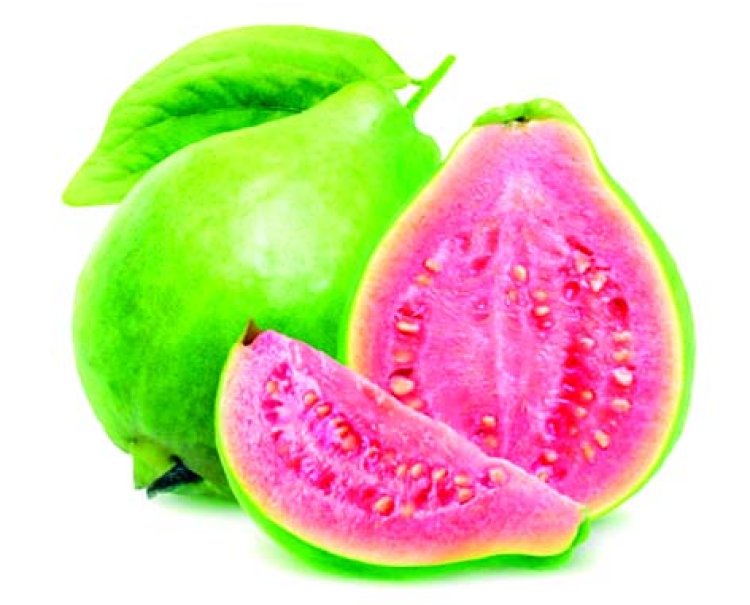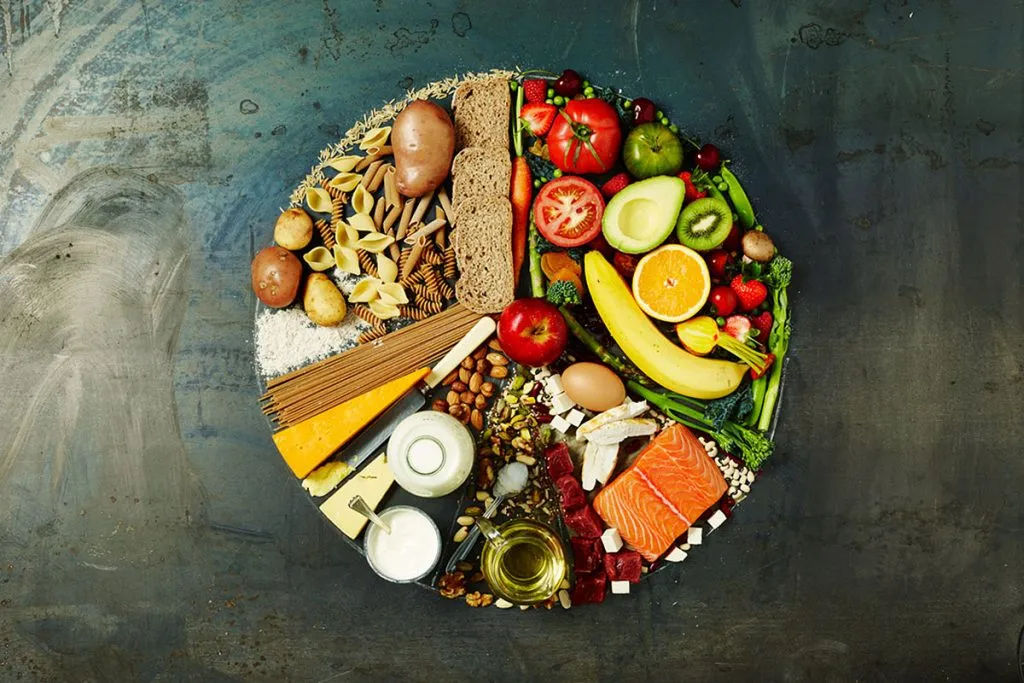Proven Health Benefits of Guavas: The centre of a guava, also known as "amrood" in Hindi, is filled with microscopic, firm seeds. It is indigenous to Central America and possesses an adaptable inner and outer layer. In addition, it possesses a distinct character and aroma. It is considered one of the finest superfruits due to its numerous health benefits.
Guava is a nutritional dynamo. It is an excellent source of antioxidants, vitamins C and A, lycopene, calcium, manganese, and potassium. Guava is also low in calories and high in fibre, making it an excellent addition to your daily diet.
Physical Structure of the Guava Fruit
The myrtle family is the dicotyledonous plant family to which guava belongs. The plants have 5 to 15 cm long, dark green foliage. The guava blossoms are white and have numerous stamens.
Guavas range between 4 and 12 cm in length. They possess a fragrant aroma analogous to the delicate scent of lemon rind. When a fruit is mature, its outer epidermis becomes tender and its interior acquires a sweet flavour.

Nutritional Facts of Guavas
100 grams of guava contains
- Calories: 68
- Total Carbohydrate: 14g
- Sugar: 9 g
- Fibre: 5 g
- Protein: 2.6g
- Fat: 1g
- Saturated fat: 0.3g
- Sodium: 2mg
- Potassium: 417mg
- Vitamin C: 228.3mg
- Vitamin B6: 5% of RDA
- Vitamin B9: 12% of RDA
The calorie count per serving of guava is reasonable, given its immense nutritional value. It contains very little oil and is abundant in fibre and protein.
Other vitamin B components such as niacin, thiamine, and riboflavin are present in substantial amounts. There are also trace amounts of vitamin A and vitamin K. Moreover, guavas are rich in manganese, phosphorus, and magnesium. Other minerals such as zinc, calcium, and iron are present in lesser amounts.
12 Proven Health Benefits of Guavas
There are numerous advantages to consuming guavas. However, the benefits of guava leaves surpass those of the fruit itself. It contains an abundance of phenolic compounds with antibacterial properties. These compounds provide protection against infectious and parasitic diseases, including Staph and Candida (yeast) infections. In addition to alleviating coughs and colds, guava leaves are an excellent home remedy for toothaches, inflamed gums, and oral ulceration, as well as preventing infections. Here are given 12 Proven Health Benefits of Guavas.
1. Guava Helps Build Immunity
Guavas are an excellent source of vitamin C and contain twice as much vitamin C as oranges. Vitamin C plays a crucial role in boosting the immune system and preventing infections by destroying harmful bacteria and viruses. According to studies, vitamin C can shorten the duration of a cold. Therefore, it is essential to consume vitamin C on a regular basis.
Moreover, guava enhances iron absorption, thereby preserving your immunity and making you stronger.
2. Guava is a Diabetic-Friendly Fruit
Guava is a rich source of fibre and has a low Glycemic Index, making it suitable for diabetics. While the low Glycemic Index prevents an abrupt increase in blood sugar levels, the high fibre content ensures that sugar levels are well-controlled.
A study demonstrates that extracts of guava leaf can reduce blood sugar levels. In addition, they can assist in the management of hyperinsulinemia, long-term blood sugar, hypercholesterolemia, hypoadiponectinemia, and hyperglycemia.
Therefore, it is one of the finest fruits diabetic patients and those seeking to prevent diabetes should consume.
3. Guava Keeps the Heart Healthy
Guavas contain high levels of potassium and sodium, which help regulate hypertension patients' elevated blood pressure. A study suggests that consuming ripe guava before meals may reduce blood pressure, lower total cholesterol, and enhance "good" cholesterol by 8%. All of these factors contribute to cardiac health improvement.
Another study indicates that guava leaf extracts aid in lowering blood pressure, decreasing "bad" cholesterol, and increasing "good" cholesterol. It is reasonable to conclude that guava leaf extracts reduce the risk of cardiac disease and stroke.
4. Guava May Help with Weight Loss
Guava is an excellent choice if you are trying to lose weight because it helps regulate your metabolism and maintains your protein, fibre, and vitamin intake. Moreover, guavas are a substantial snack that keeps you satisfied for a long time.
Replacing saccharine beverages and foods with guava tea and guavas will aid in weight loss. This is due to the fact that guavas are low in calories yet extremely satisfying.
5. Guava Improves Digestive Health
The guava contains more dietary fibre than other fruits. The bulking and softening effects of fibre on stool tend to alleviate constipation and diarrhoea. One guava provides 12% of the daily recommended fibre consumption. This makes it extremely advantageous for digestive health and regular bowel movements. Additionally, when ingested whole or digested, guava seeds are effective laxatives.
According to a study, guava leaf extracts may also be used to reduce the severity or duration of diarrhoea. Another study demonstrates that these extracts contain antimicrobial properties that help eliminate hazardous bacteria in the intestines that cause diarrhoea.
6. Guava May be Good for the Brain
Vitamins B6 and B3, also known as pyridoxine and niacin, are also abundant in guavas. These two micronutrients enhance brain blood flow, calm anxiety, and promote cognitive function.
7. Guava Improves Skin Health
If you are among the many who wish to prevent facial creases and wrinkles, then guava is the fruit for you.
Carotenoids, lycopene, and vitamins A and C found in abundance in guavas safeguard the epidermis from a variety of skin-related issues. Moreover, a study confirms that the antioxidants found in guavas have anti-aging properties.
Additionally, research indicates that guavas possess anti-inflammatory and antimicrobial properties. Therefore, ingesting guava restores the radiance and vitality of the epidermis. Additionally, it prevents issues such as discoloration, dark circles, irritation, and acne. The fruit also tones and tightens facial musculature, leaving your skin youthful and elastic.
8. Guava Helps Relieve Stress
The fruit's magnesium content serves to calm the body's muscles and nerves. Additionally, it helps you effectively relax and calm down. Therefore, eating guava after a long day of work or an exhausting exercise will relieve tension and provide your body with a much-needed energy boost.
9. It is Helpful During Pregnancy
NTDs contribute to miscarriage, infant mortality, severe congenital abnormalities, and severe disabilities. A daily consumption of 400 micrograms of folic acid at least one month prior to conception and throughout the first trimester of pregnancy may reduce the risk of NTDs by up to 80%, according to a study.
Folic acid is abundant in guava. Thus, it is beneficial for expectant women. This is because it aids in the development of the baby's nervous system and prevents birth defects. In addition, the B vitamin present in the fruit facilitates cell division and aids in the production of DNA and foetal genetic material. Consequently, guava would be an excellent supplement to a pregnant woman's diet.
Additionally, guavas are abundant in vitamin C, which enhances iron absorption. In turn, this aids expectant women in delivering oxygen to their infants. This has been linked to increased foetal and infant growth until the age of six months, according to studies.
Also read: Health Benefits of Eating Guava
10. Guava Helps Reduce Menstrual Pain
Many women suffer from severe menstrual cramping (dysmenorrhea) during their period. A study involving 197 women with severe menstrual cramps who consumed 6 mg of guava leaf extract daily revealed a reduction in pain intensity. The study also indicates that guavas may be more effective than some medications.
11. Guava Helps Reduce the Risk of Cancer
Antioxidants such as lycopene, quercetin, vitamin C, and other polyphenols neutralise free radicals and prevent the growth of malignant cells when present in the body. Extracts of guava leaf reduce the risk of prostate cancer and inhibit the development of cancer cells, according to a study.
12. Guava Improves Eyesight/Vision
Guavas are the second well-known fruit that improves eyesight and vision health, following carrots. Vitamin A not only prevents the deterioration of eyesight, but also contributes to its improvement. Additionally, it prevents the development of macular degeneration and cataracts.
Summary
Guavas have numerous health advantages, but the phenolic compounds in guava leaves have antibacterial properties that surpass those of the fruit. They provide protection against infectious diseases and treatment for oral problems. Due to their high vitamin C content, guavas boost immunity, aid in diabetes management, promote heart health, aid in weight reduction, improve digestion, boost cognitive function, improve skin health, alleviate tension, and provide benefits to pregnant women. In addition, they alleviate menstrual pain, reduce the risk of malignancy, and promote eye health. Guavas are a beneficial addition to a healthy diet due to their numerous benefits.
Where in India is Guava Popular?
India's climate makes it a suitable location for guava cultivation. Consequently, guavas are one of the top four products that can be grown here. Uttar Pradesh and Maharashtra are the leading provinces for guava cultivation. Andhra Pradesh, Tamil Nadu, and Bihar closely follow this list. The guava season varies by jurisdiction and its agricultural practises. India's guava output has increased by 55 percent over the past four decades.
- Sardar and Allahabad Safeda are two of the most famous guava types in India. It is due to their excellent quality and high-yielding abilities.
- Vijayawada and Nuzvid are some of the significant cultivators of the Sardar or Lucknow variety.
- The Allahabad variety finds its majority cultivators in Odugathur, Madurai, and Theni.
- Some of the other guava varieties are Lalit, Dhareedar, Safed Jam, etc.
Uses of Guava Fruit
Numerous cuisines utilise guava juice. Agua Fresca, for instance, is a popular guava beverage consumed in Latin American countries. This juice is added to sauces, chocolates, and nibbles to enhance their flavour. In addition, red guavas are commonly used in sauces and other preserved foods to imitate the flavour of tomatoes.
Sugar is the primary component of pectin, which is abundant in guavas. Consequently, guavas are an excellent choice for pastries, preserves, and jellies. Guava puree imparts a delicious taste to ice creams and beverages. Guava leaves are consumable as medicinal beverages and dietary supplements.
Ways to Consume Guava
Fully ripe guavas have a sweet taste. Check for guavas with pale yellow or green skin. Ripe guavas are soft to the touch, similar to a ripe avocado. Choose the sweetest ones for all the recipes given below.
- The easiest way to consume guava is to eat them as they are. The entire fruit, along with the seeds and the skin, is edible. You can bite into the whole fruit like an apple.
- Additionally, you can consume guavas with chilli powder or pepper and salt. Slice up the guavas and sprinkle some chilli powder and salt on its flesh. The spicy and salty flavour perfectly complements the fruit’s sweetness.
- It is equally essential to pair up guavas with other fruits. It increases the potency of your fruit platter. Cut the guavas with other fruits and add them to a fruit salad.
- It is a healthy dessert or breakfast option. In addition, guavas taste amazing in coleslaw as well.
- Guava juice is an excellent alternative to eating fruit. The mildly sweet taste and the soft flesh make it a good option for blending juices. Besides, you can grind guava pieces with some milk to make smoothies.
- Also, take the smoothie up a notch and add other fruits of your choice, some raw honey, chia seeds, and some nuts. It is a filling snack or breakfast item.
- Cook guavas with some jaggery powder to make a sauce out of them. The sauce works very well with pancake, yoghurt and oatmeal.
- Guavas add a delicious flavour to ice creams, jellies and candies. So, it makes for a healthy option for dessert while satisfying your sweet tooth.

Best Nutritionist-approved Recipes using Guava
1. Guava Yogurt Smoothie
Ingredients
- Guava chopped – 1 cup
- Frozen banana slices – ½ cup
- Low-fat yoghurt – ½ cup
- Ice cubes
Method
- Blend all ingredients and serve chilled
2. Guava Pomegranate Salad
Ingredients
- Guava chopped: 1 cup
- Pomegranate pearls: 1 cup
- Roasted peanuts: 1 tbsp
- Mint chopped: 1 tbsp
For Dressing
- Lime juice: 1 tbsp
- Black salt: ¼ tsp
- Cumin powder: ¼ tsp
- Red chilli powder: ¼ tsp
- Chat masala: ¼ tsp
Method
- Mix the ingredients for the dressing
- Combine the fruits, peanuts, mint and dressing in a bowl and mix well
Guava: Precautions
While there are many benefits to consuming guavas, there are a few precautions or things before adding them to your daily diet. They are as follows:
- Pregnant or breastfeeding individuals: There isn’t any conclusive evidence on whether guavas, as a medicine, are safe for people who are pregnant or breastfeeding. Therefore, to be on the safe side, eat it in small quantities as a regular fruit. Also, make sure to wash and peel the skin off the guavas before eating to reduce the likelihood of ingesting any harmful bacteria. Most importantly, consult your doctor before taking supplements of any kind.
- Diabetic patients: We know that guavas may reduce your blood sugar. However, people with diabetes must constantly keep track of their blood sugar levels while eating guavas.
- Patients with skin conditions: The extracts from guava leaves may contain chemicals that irritate your skin. It can exacerbate skin conditions like eczema. So, if you have eczema or other similar conditions, consume guavas cautiously or avoid them altogether.
- Patients with upcoming surgeries: Those scheduled for any kind of surgery should try to avoid eating guavas in the two weeks leading up to it. That is because guavas may interfere with blood sugar control or worsen the risk of bleeding during and/or after the surgery.
- The extract from a guava leaf may also cause stomach pain, nausea or bloating as a temporary side effect.
HealthifyMe Suggestion
Adding guavas to the list of fruits you consume on a regular basis can be extremely beneficial due to the abundance of nutrients they contain.
Whether you choose conventional guavas, those with pink flesh, or the Thai variety, they are all nutrient-dense and delicious on their own or blended into a salad or smoothie.
To combat the humidity in the summer, you can deseed guavas, freeze them, and blend them into a delicious guava sorbet.
Conclusion
Guavas are an enchanted fruit. It is low in calories and nutrient dense. The most mature guavas are translucent yellow or light green. The fruit's moderate flavour and tender flesh make it a delectable option.
It is high in fibre and vitamins and minerals. They are rich in the immunity-boosting and skin-healing vitamin C. It is a fruit that is suitable for diabetics and also promotes cardiac health.
Guava leaf preparations are extremely potent. Consequently, they assist digestion and alleviate menstrual discomfort. According to some studies, they even possess anti-cancer properties.
In conclusion, guavas are an excellent complement to your diet. The nutrients it contains will improve your health. Include it on your shopping agenda to reap its benefits.
Consume guava on a daily basis if you want to increase your vitamin C intake for a stronger immune system, or if you merely want a versatile, tasty, and nutritious food option.















